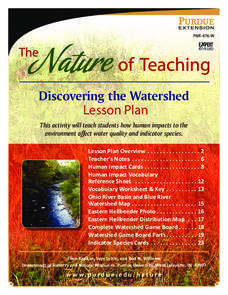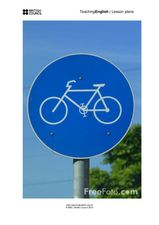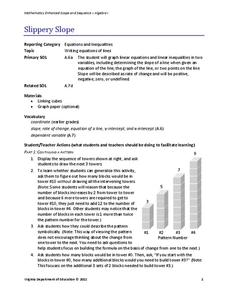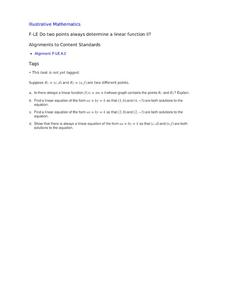Reed Novel Studies
The Little Prince: Novel Study
Do our eyes play tricks on us? The Little Prince narrator begins with a discussion of the difference in what grown-ups and children see. Scholars read how he puts this to the test using a drawing and find synonyms to vocabulary...
K12 Reader
Writing with Subordinating Conjunctions
Challenge young grammarians to turn sets of phrases into sentences by adding subordinating conjunctions on a short worksheet.
Purdue University
Discovering the Watershed
Human impact on watersheds can make or break an ecosystem. Learners use a game to learn about the impact human choices have on water quality and the organisms that depend on it. The activity includes a game board and game cards that tell...
PBS
What's the Matter? | UNC-TV Science
Explore what makes up the universe and demystify the complex ideas of matter and the atom. Group members watch a video with explanations, animations, and examples that discuss the characteristics and importance of matter. Scholars then...
GLOBE Program
Calculating Relative Air Mass
Combine math and science with fun in the sun! Scientists build a solar gnomon using reusable materials to calculate relative air mass. Mathematicians measure the pole's shadow and use the data to solve for relative air mass....
DocsTeach
Two Moments in the Life of Rick Rescorla: Vietnam and 9/11
He saved a group of men under fire from the Viet Cong, and he urged those fleeing the burning Trade Center Towers on 9/11 to "be calm, be strong." Rick Rescorla was last seen going back into the twin towers to bring others to safety....
Curated OER
Champions Of The Land
Young scholars write an abstract of a book concerning conservation. In this environmental activism lesson plan, students explore books such as Silent Spring by Rachel Carson. Young scholars choose a book about conservation from a...
Curated OER
Sculpture in Relief
Fourth graders create an abstract wall relief that incorporates the use of free form shapes, lines, movement, & color. They use oak tag, toilet paper holders and glue to create their sculptures.
Curated OER
Poetry for Kids
Sixth graders be immersed indirect experiences which are opportunities for students to reflect, look back, debrief or abstract from their experiences what they have felt, and thought, and studied.
Curated OER
Library Orientation
Students visit the school library for orientation and instruction on how to use the online Public Access Catalog (OPAC). They outline an abstract about Harry Potter books and answer questions on a handout about library procedures. ...
Curated OER
Newton's Laws of Motion
Sixth graders explore Newton's laws of motion with their own bodies. In this relative motion lesson plan students will use a wide range of materials bringing them from the concrete to the abstract on video. Students will draw inferences...
Curated OER
Materials and Process
Students examine the variety of materials an artist uses when drawing and consider the impact of the material choice. In this art analysis lesson, students consider the different materials used to make various drawings. Students compare...
Curated OER
The Museum Idea
Students discover the nature and uses of museums by completing several creative projects. Students also analyze abstract art with teacher guidance.
Curated OER
Teaching English: Reducing Emissions by Cycling
For this ESL worksheet, students analyze an abstract picture and create the persona of a cyclist. Students cut apart cards with controversial statements regarding cycling and discuss them. Students then discuss what they personally would...
Virginia Department of Education
Slippery Slope
Explore slope using geometric patterns. Young mathematicians investigate towers built from cubes to develop a linear pattern. They move the data to a coordinate plane to connect the pattern to slopes.
Curated OER
Do Two Points Always Determine a Linear Function II?
Learners analyze the difference between the slope intercept and standard forms of a line in this task. Given two general points using letters they explore linear functions and linear equations.
Curated OER
Space and Shape in Geometry:
Students are asked to visualize three-dimensional figures and apply this visualization to problem solving.
Curated OER
Georgia O¿¿¿Keeffe¿¿¿s floral paintings
Students discuss the differences between realistic and abstract art by focusing on Georgia O'Keeffe's work The lesson can be delivered in either a simplistic or more complex way depending upon the grade level.
Curated OER
Poetry Book
Students study the following terms and concepts: word choice, dialect, invented words, concrete terms, abstract terms, figurative and sensory language. In cooperative groups, they select three of the terms, research them, and pick poems...
Curated OER
4 Different Ways to View Our City
Seventh graders make magnificent abstract paintings based upon their realistic photographs.
Curated OER
Sculpture Shapes
Pupils reconstruct an ancient Greek sculpture using various geometric forms and explore different geometric forms. They create an abstract human form out of geometric shapes and create other representations out of the same shapes.
Curated OER
Express Yourself: Make Art From Your Ideas
Learners analyze and discuss various sculptures by the artist Andrea Arroyo. They discuss ways artists use symbols to express abstract ideas, design and create a plasticine plaque, and write a journal response.
Curated OER
Describing Words
First graders brainstorm adjectives, recognize adjectives within text read by teacher, identify sentences that contain adjectives using Hyperstudio stack, and write two descriptive sentences for abstract image they create.
Curated OER
Fraction Lessons That Motivate
Fraction lessons can provide both concrete and abstract ways to teach students about the concept of equal parts.
Other popular searches
- Abstract Nouns
- Abstract Art
- Concrete and Abstract Nouns
- Abstract Nouns Worksheets
- Abstract Flowers
- Abstract Art Picasso
- Abstract Expressionism
- Abstract Music
- Abstract Geometry
- Abstract Impressionism
- Abstract Drawing
- Adjectives and Abstract Nouns























